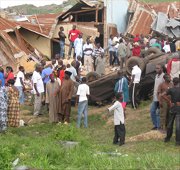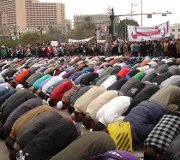(Story photo by Chris Brown) [Cover photo by Joe Coyle]
International (MNN) ―Reports of violence and threats of violence have come from all over the Muslim world since the start of Ramadan on Monday August 1.
In Pakistan, at least 10 have been killed since the Muslim holy month began. A Singaporean news source reports that a sect of minority Muslims in Indonesia fear for their lives in the face of Islamic extremists during Ramadan.
Christians throughout the world are at high risk.
It's typical for violence to heighten during Ramadan throughout Muslim cultures worldwide, but the flare-ups have been worsening year by year. One expert on Islam told Mission Network News that there are two main reasons for this: religion and politics.
Fouad Masri, founder of the
Crescent Project, says devout Muslims spend the month of Ramadan fasting daily, praying, chanting the Qur'an, reading the Qur'an, taking trips to the mosque, and proving their devotion to God. Masri attributes much of the violence to a sense of cleansing that some Muslims feel necessary during what's considered the holiest of months.
"Because it's a holy month, if you (as a Muslim) touch someone who is not Muslim, that defiles you," explains Masri. "Now the violence happens because you want to
cleanse the society. These non-Muslims are probably eating while they're supposed to be fasting. You want to show God that you are so zealous for Him and for Islam, that you are willing to kill them or expel them from your community."
Masri says it is a matter of seeing impurity as external and religion as external, rather than an internal, heart devotion.
That's the religious aspect, but it doesn't seem to explain why violence would be increasing over the years. For that issue, the tables turn to politics.
"Islam is a political system," says Masri. "They need to take charge of the political structure, and as they see themselves losing in the political arena, they need to bring up political issues across the Muslim world--from Morocco all the way to Indonesia."
Unlike Christianity, says Masri, Islamic communities bring up more political issues as opposed to moral. "The whole system there is in upheaval, politically. So you have the mosque or the elders of the religion
siding with one group or the other. In the recent decade, they've seen that there is the concept of jihad on the right, through terrorism--groups like al Qaeda who are propagating jihad more and more."
As the rift between Sunni and Shiite deepens, violence is increasingly used as a solution, as well. Masri says there are no verses in the Qur'an that allude to reconciliation, and "violence is an easy way to get rid of things. Communication, discussion, dialogue takes time."
The increase in violence is enough to cause believers in Muslim nations to lay low, and with good reason. They have often been the subject of extremists' cleansings or have been scapegoats for other matters during Ramadan.
Masri, who grew up during wartime in Lebanon, says that the Lord uses His people during Ramadan, as well as other times, to share the Good News.
"The way you share the Gospel, and your activities, change. But you find that the Holy Spirit opens more doors.
Sometimes you'll be sharing the Gospel when bombs are flying. Or maybe there's a car bomb that explodes, and then you're able to minister to the neighbors and to the injured people," notes Masri.
The amazing thing, especially during Ramadan, is that many Muslims seem to be open to hearing the Gospel. They are drawn to the peace that characterizes the believers around them.
"So many times we look at the situation through temporal eyes, and we say, ‘Wait a second, there's violence. We should lay low. We should probably not share.' And suddenly, the Holy Spirit opens huge doors for us, maybe through these activities around us," says Masri. "The violence proves that Islam has not solved the human problem."
Pray that believers in Muslim nations would be bold this month. Pray for God to cause many to hunger for the Truth during Ramadan. Pray that those who are seeking another truth would find the only Truth.
For a full prayer calendar during the month of Ramadan, click here.







